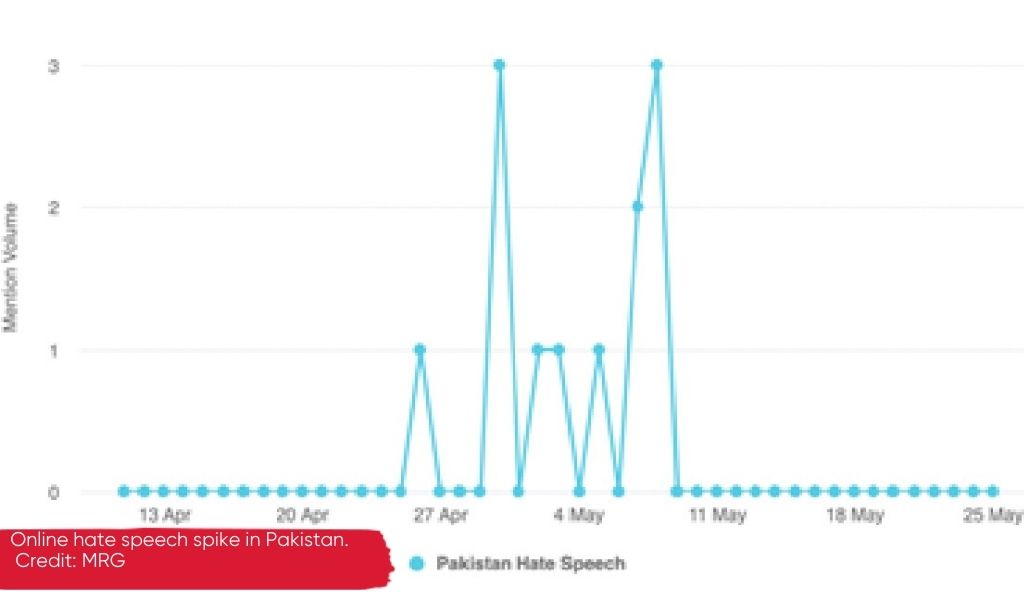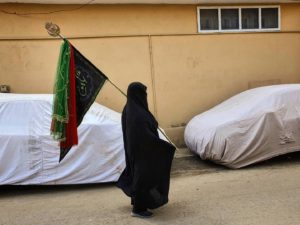Members of the IDS-led Coalition for Religious Equality and Inclusive Development (CREID) identified a spike in online hate speech towards Pakistan’s Ahmadiyya community in April and May this year and rapidly mobilised to raise the alarm with international stakeholders, including the UN Special Rapporteur for Freedom of Religion or Belief, Ahmed Shaheed.

Graph showing spike in online hate speech in Pakistan in April / May 2020
Hate speech against religious minorities in Pakistan has been increasing in frequency, especially against members of the Ahmadiyya community. CREID partner Minority Rights Group (MRG) worked with local partners to set up the Pakistan Hate Speech Monitor to mine hate speech data on social media. The monitor analyses data and hate speech trends specific to religious minorities.
In May, a hate speech spike was recorded against the Ahmadiyya community, which was particularly concerning due to the involvement of senior public figures. MRG and CREID responded with strong advocacy efforts which reached the UN Special Rapporteur on Freedom of Religion or Belief, who subsequently wrote a letter to Pakistani government officials condemning the incident.
Why this is important
Ahmadis in Pakistan are strongly stigmatised, socially and economically alienated and subject to some of the worst forms of hate-based violence. On social media, Ahmadis are commonly labeled as infidels (kafir) who should be killed (Wajib-ul-Qatal). Though self-defining as Muslims, Ahmadis are included in the list of non-Muslims in the Second Amendment of the Constitution of Pakistan (ratified in 1974).
In May 2020, rumours circulated that an Ahmadi representative was to be included in the newly announced National Minority Commission by the Ministry of Religious Affairs, however the government denied these report after a widespread public and intra-party political backlash, including from senior government officials, who publicly expressed hate against the Ahmadiyya minority on Facebook, Twitter and through mainstream TV channel interviews. In April 2020, the Pakistan State Minister for Parliamentary Affairs, Mr. Ali Muhammad Khan, had already posted a tweet which included the phrase “the only punishment for blasphemers is beheading”.
In the days after these events a major spike in online hate speech targeting the Ahmadi community was seen on all platforms (as shown in the graph above). One post called for the listing of Ahmadi names and addresses, which is a known precursor to violent attacks and even genocides.
Atrocities done in the name of religion in Pakistan are condemned by many fellow citizens, yet speaking out is risky for dissenters. Any individual, group or organisation that speaks out against the discrimination and harassment of Ahmadis, or in support of their constitutional rights, may also face death threats or societal pressure to stay silent. This means international stakeholders have an important role to play in engaging with the Pakistani government on these issues.
Impact
MRG and CREID took this issue to the UN by engaging the Special Rapporteur on Freedom of Religion or Belief, Ahmed Shaheed, highlighting the plight of Ahmadis and the looming threat of further persecution. Mr Ahmed Shaheed then officially wrote to the government of Pakistan together with his colleague the SR on Freedom of Expression, first on May 8, 2020 and again on August 7, 2020.
In his letters, the Special Rapporteur specifically highlighted the case of hate mongering on social media by public figures and demanded that the Pakistani government “…provide the details and, where available, the results of any investigation and judicial or other inquiries which may have been carried out, or which are foreseen, into the allegations of inciteful tweet of the State Minister Ali Muhammad Khan and actions taken to ensure the non-recurrence of such incident and accountability as a political leader.”
With similar initiatives, the issue of the persecution of Ahmadis can be further highlighted to reduce their plight in Pakistan.

